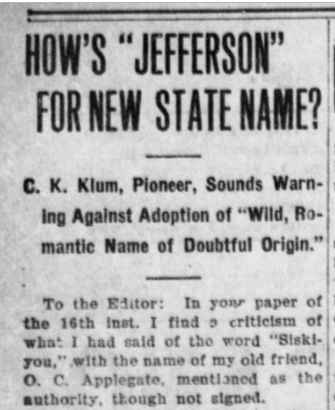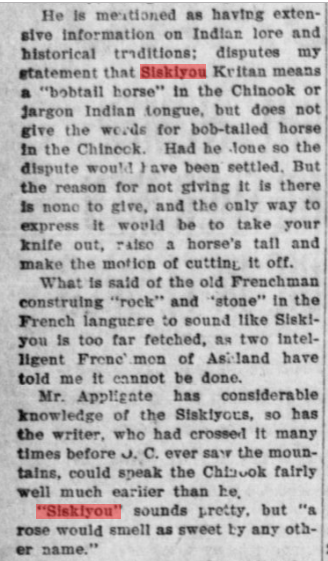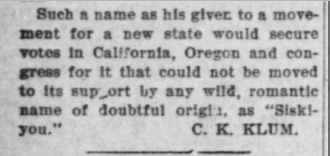Siskiyou etymology dispute, 1910
The American West of the Settler society has a long and steady history of arguing & separatism…
…And today we read some pretty wonderful firsthand testimony that splits hairs over a Chinook Jargon word — and implicitly confirms the frequent association of CJ and sign-language gestures.
< Siskiyou > ‘bob-tailed horse’ has been much discussed and disputed. Besides the French ‘six stones’ etymology that’s shot down here, we’ve heard it suggested that it’s ultimately from Cree. (Which would make a lot of sense, if it were a Métis word. French-Canadians gave Chinuk Wawa much of its horse terminology.)
There were suggestions to rename Oregon — or split off a new state — to be called “Siskiyou”. Read on…
HOW’S “JEFFERSON” FOR NEW STATE NAME?
C. K. Klum, Pioneer, Sounds WarnIng Against Adoption of “Wild, Romantic Name of Doubtful Origin.”
To the Editor: In your paper of the 16th inst. I find a criticism of what I had said of the word “Siskiyou,” with the name of my old friend, O. C. Applegate [1845-1938], mentioned as the authority, though not signed.
He is mentioned as having extensive Information on Indian lore and historical traditions; disputes my statement that Siskiyou Kuitan means a “bobtail horse” in the Chinook or Jargon Indian tongue, but does not give the words for bob-tailed horse in the Chinook. Had he done so the dispute would have been settled. But the reason for not giving it is there is none to give, and the only way to express it would be to take your knife out, raise a horse’s tail and make the motion of cutting it off.
What is said of the old Frenchman construing “rock” and “stone” in the French language to sound like Siskiyou is too far fetched, as two intelligent Frenchmen of Ashland have told me it cannot be done.
Mr. Applegate has considerable knowledge of the Siskiyous [mountain range], so has the writer, who had crossed it many times before O. C. ever saw the mountains, [and] could speak the Chinook fairly well much earlier than he.
“Siskiyou” sounds pretty, but “a rose would smell as sweet by any other name.”
Society is always under obligation to its predecessors; those who had acted wisely and made the path smooth for their successors.
We have had men who exhibited a wisdom and prescience for our welare that places us under a debt of gratitude, and their names should be given to our new states.
Jefferson, in accepting Bonaparte’s offer for the sale of the “Louisiana Purchase” without any constitutional authority, as he admits, for doing it, placed us under such obligation. Acting without loss of time, he at once organized and sent off the Lewis and Clark exploring expedition to cinch and bind the bargain. And the men selected to lead the expedition did their work with the heroic determlnation of Jefferson. Greatest exploration in America.
Our history is so full of excellent men that it would take time to mention them. The name “Lincoln” is nearest and dearest to the American heart.
His growth from the lowest ranks of labor to the front rank in statesmanship brought him in touch with all.
Such a name as his given to a movement for a new state would secure votes in California, Oregon and congress for it that could not be moved to its support by any wild, romantic name of doubtful origin, as “Siskiyou.” C. K. KLUM [1829?-1911].
— from the Medford (OR) Mail Tribune of March 25, 1910, page 2, column 1





I think Gibbs had it so it but my understanding, now fading with time, is that it did indeed arrive in the mouths of the “French” voyageurs but it was from Algonquin.
LikeLike
Yup, Gibbs 1863 had it from Alexander Caulfield Anderson’s personal communication. He doesn’t find an etymology that satisfies him, however! Surely there ought to be evidence of such a word in the literature on Canadian and Misississippi Valley French…?
LikeLike
Another note — Samuel V. Johnson’s 1978 dissertation conflates “siskiyou” and (Salish) “stiqiw” into a single entry that he glosses as generic ‘horse’. Definitely two separate words in reality. But as we’ve noted on this site previously, both (along with “cayuse”) conceivably share a root shaped like /kiw/. And that root may go back to Spanish “caballo”, judging by horse words in various Indigenous languages to the south of the Pacific NW.
LikeLike
Pingback: Some arguments about CW never go away! | Chinook Jargon